Unit 2 What time do you go to school Section B 2a—2c 课件(共23张PPT) 人教版七年级英语下册
文档属性
| 名称 | Unit 2 What time do you go to school Section B 2a—2c 课件(共23张PPT) 人教版七年级英语下册 | 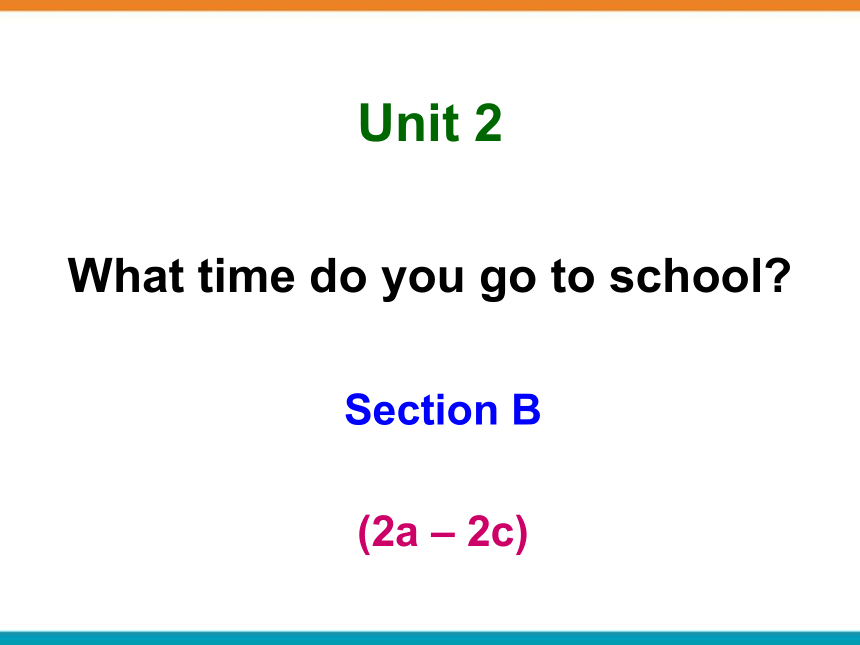 | |
| 格式 | pptx | ||
| 文件大小 | 918.7KB | ||
| 资源类型 | 教案 | ||
| 版本资源 | 人教新目标(Go for it)版 | ||
| 科目 | 英语 | ||
| 更新时间 | 2024-02-03 22:23:54 | ||
图片预览

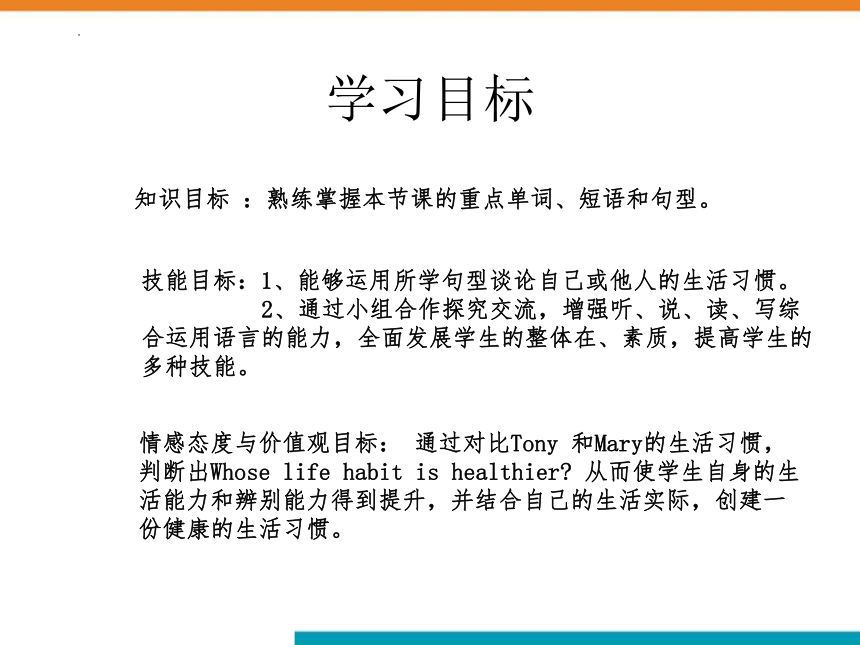
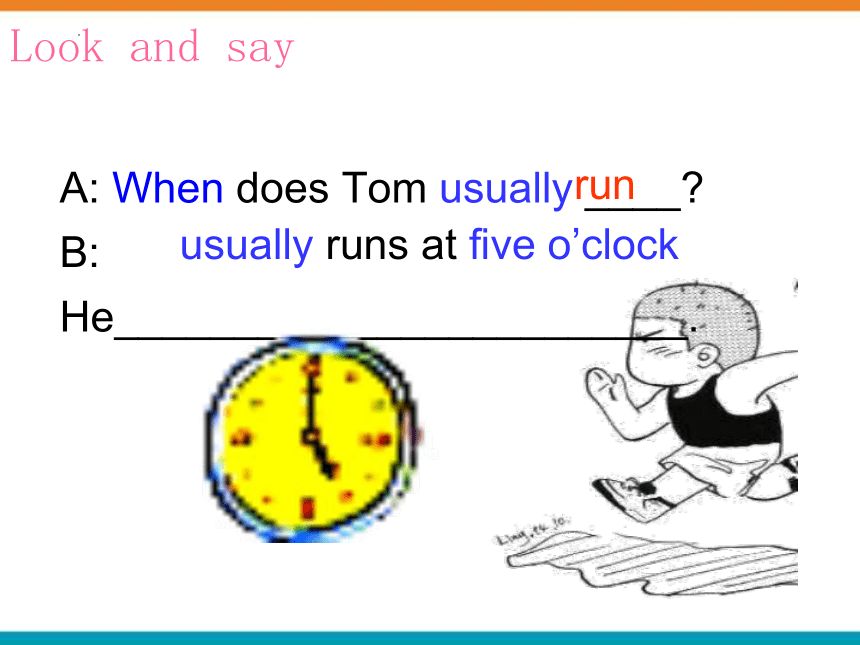
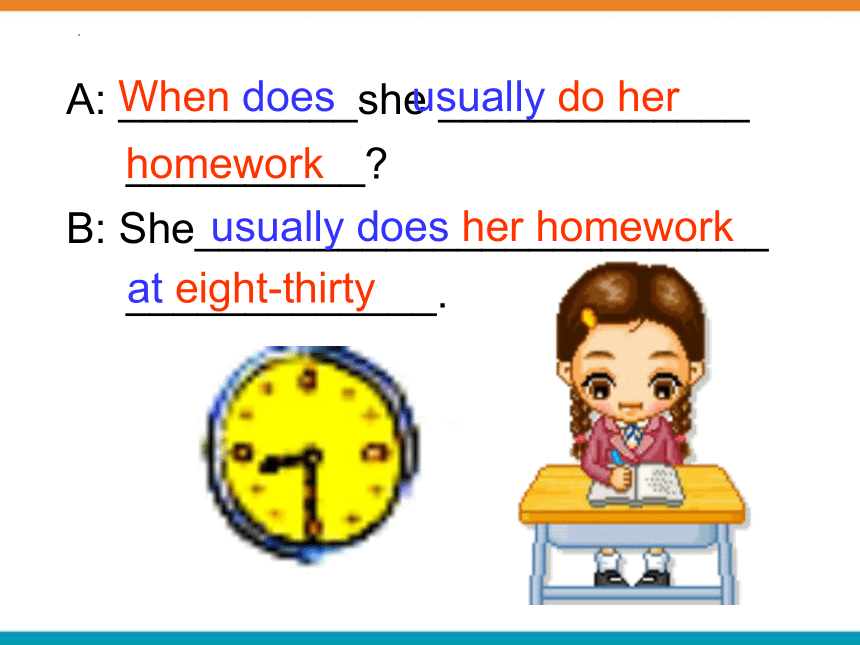
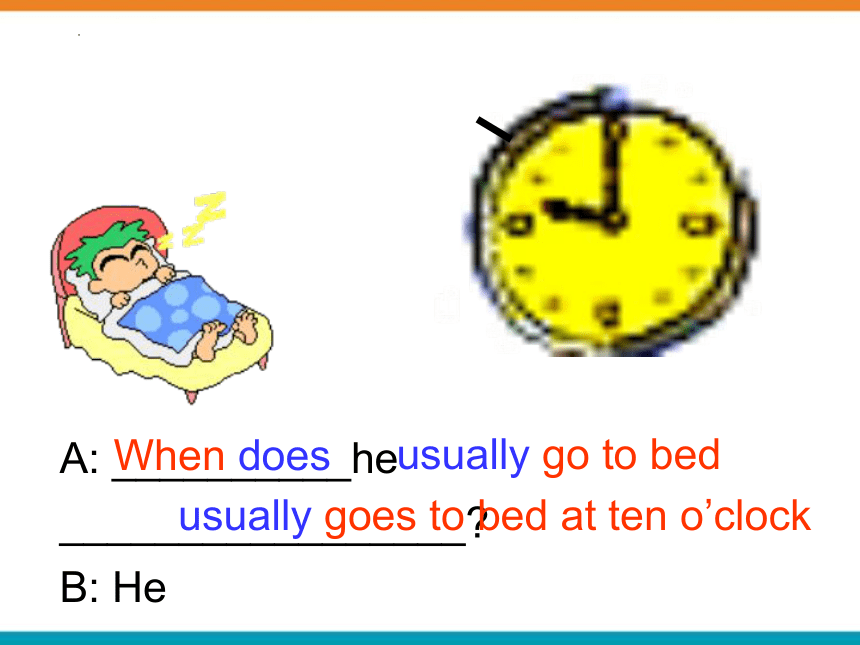
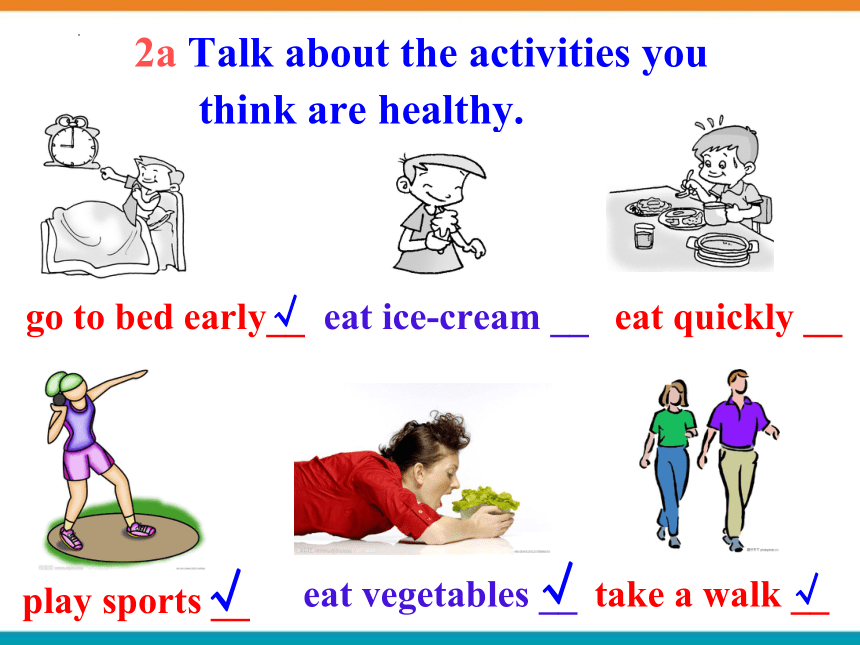
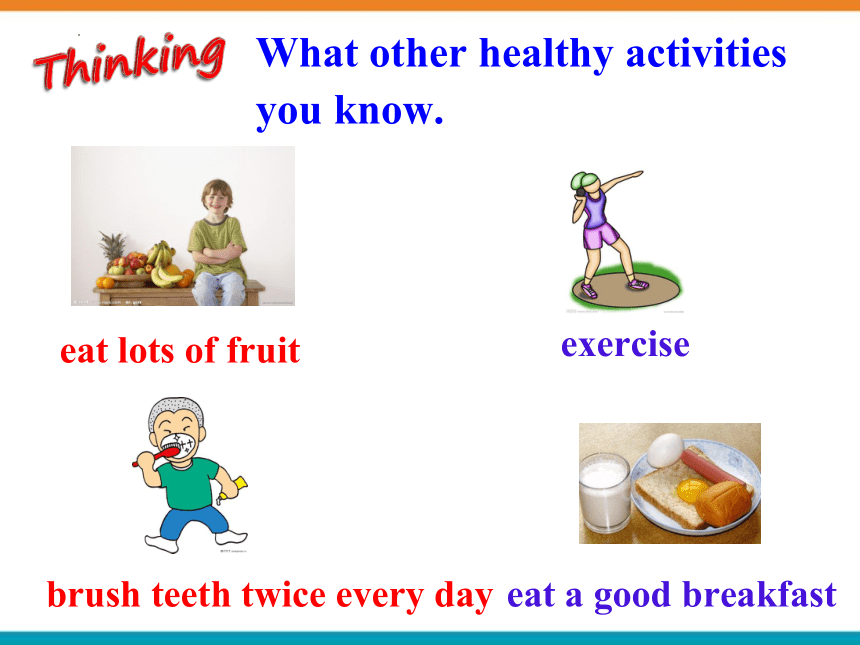
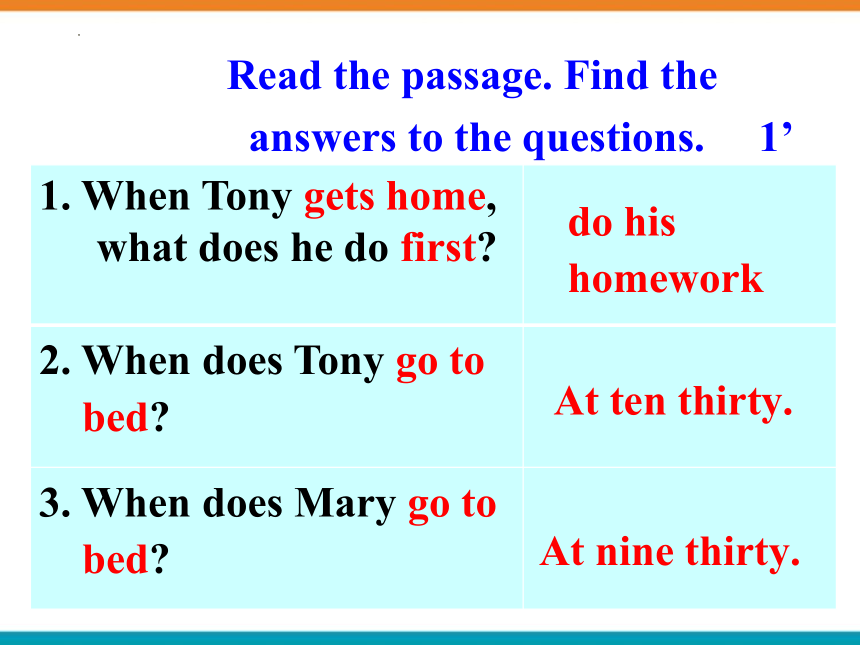
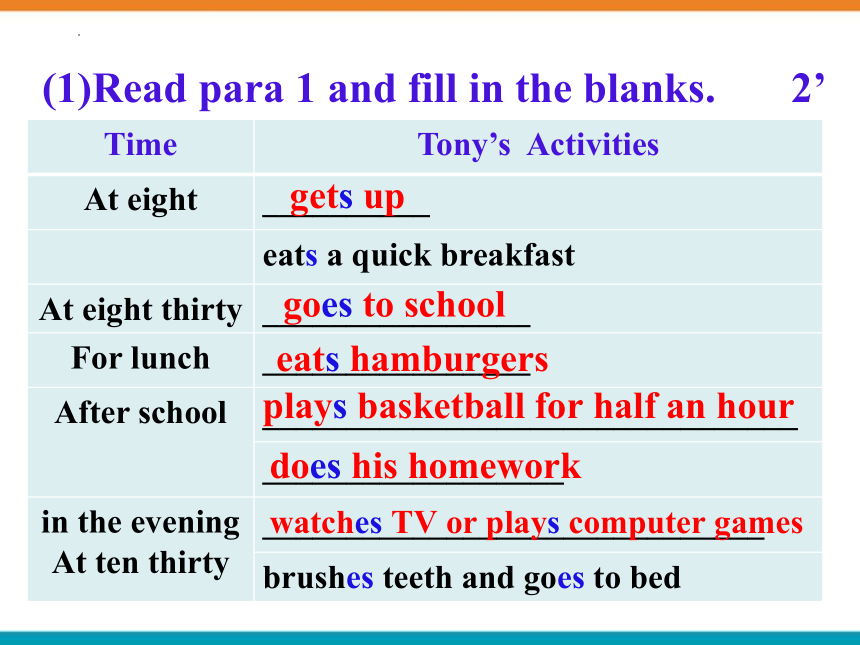
文档简介
(共23张PPT)
Unit 2
What time do you go to school
Section B
(2a – 2c)
学习目标
知识目标 :熟练掌握本节课的重点单词、短语和句型。
技能目标:1、能够运用所学句型谈论自己或他人的生活习惯。
2、通过小组合作探究交流,增强听、说、读、写综合运用语言的能力,全面发展学生的整体在、素质,提高学生的多种技能。
情感态度与价值观目标: 通过对比Tony 和Mary的生活习惯,判断出Whose life habit is healthier 从而使学生自身的生活能力和辨别能力得到提升,并结合自己的生活实际,创建一份健康的生活习惯。
A: When does Tom usually ____
B: He________________________.
Look and say
run
usually runs at five o’clock
A: __________she _____________
__________
B: She________________________
_____________.
When does
usually do her
homework
usually does her homework
at eight-thirty
A: __________he _________________
B: He _____________________________.
When does
usually go to bed
usually goes to bed at ten o’clock
go to bed early__
eat ice-cream __
play sports __
eat quickly __
take a walk __
eat vegetables __
2a Talk about the activities you
think are healthy.
√
√
√
√
brush teeth twice every day
exercise
eat lots of fruit
Thinking
What other healthy activities
you know.
eat a good breakfast
1. When Tony gets home, what does he do first
2. When does Tony go to bed
3. When does Mary go to bed
do his homework
Read the passage. Find the
answers to the questions. 1’
At ten thirty.
At nine thirty.
(1)Read para 1 and fill in the blanks. 2’
Time Tony’s Activities
At eight __________
eats a quick breakfast
At eight thirty ________________
For lunch ________________
After school ________________________________
__________________
in the evening At ten thirty ______________________________
brushes teeth and goes to bed
gets up
goes to school
eats hamburgers
plays basketball for half an hour
does his homework
watches TV or plays computer games
Time Mary’s Activities
____________ gets up
takes a shower and eats a good breakfast
____________ goes to school
At twelve ____________________________
After lunch After dinner ______________
______________
in the evening At nine thirty _________________________________________
goes to bed
At six thirty
At eight thirty
eats lots of fruit and vegetables
plays volleyball
eats ice-cream
does her homework, swims or takes a walk
(2)Read Para 2 and fill in the blanks. 2’
1.Read 2b again and fill in the blanks.
Time My Activities
At eight __________and eat quickly
At eight thirty ________________
At noon ________________
After school ________________________________
and __________________________
In the evening ____________________________________________
At ten thirty brush teeth and go to bed
get up
go to school
eat hamburgers
play basketball for half an hour
do my homework
either watch TV or play computer games
Time Mary’s Activities
____________ gets up
takes a shower and eats a good breakfast
____________ goes to school
At twelve _____________________________
After lunch _________________ and
_____________________________
In the evening __________________________________________________________
At nine thirty goes to bed
At six thirty
At eight thirty
eats lots of fruit and vegetables
plays volleyball
eats ice-cream
does her homework and swims or takes a walk
2c
Write down the unhealthy habits of each person. Then think of healthy activities for them.
Unhealthy habits Healthy activities
Tony
Mary
have breakfast quickly
have breakfast slowly
eat ice-cream after dinner
usually eat hamburgers
get up late
get up early
Don’t usually eat hamburgers
Don’t eat ice-cream after dinner
1. In the evening, I either watch TV or play computer games.
晚上我要么看电视要么玩电脑游戏。
either…or…表示“要么……要么……;或……或……”。这个结构可用来连接两个独立的单词、短语、甚至独立的句子。如:
你可以今天或明天来。
他要么是不能来要么就是不想来。
You can come either today or tomorrow.
Either he could not come or he did
not want to.
2. She knows it’s not good for her, but it tastes good!
她知道这对她(健康)不利,但它(指冰激凌)却很好吃。
1) be good for…表示“对……有益;
对……有好处”如:
水果和蔬菜对我们的健康有好处。
Fruit and vegetables are good for
our health.
阅读对我们有益。
Reading is good for us.
2)taste表示“吃上去;吃起来;品尝”,
与我们学过的That sounds good.和It
looks nice.中的sound和look的用法同
属一类,之后要用形容词。如:
The chicken tastes nice.
鸡肉真好吃。
( )1. We go to school ______7:30.
A. in B. at C. on
( ) 2. I run at six_____ the morning.
A. at B. in C. on
( ) 3. He can do _____ homework by himself.
A. her B. him C. his
( ) 4. Don’t speak! Listen _____ the teacher.
A. to B. in C. at
B
B
C
A
Exercise
翻译:
1. 谢谢你的帮助。
2. 八点钟开始上课。
3.我想知道他的情况。
Thanks for your help. /Thank you for your help.
Class starts at 8:00.
I want to know about him.
4. 我想去打篮球。
5. 她每晚做家庭作业。
6. Mike 经常把自己的学习情况告诉妈妈。
I want to play basketball.
She does her homework every evening.
Mike usually tells his mother about his study.
用所给单词的适当形式填空:
1. Do you want ___________(have) a shower now
2. Does your sister like ________(listen) to music
3. People love to take a walk after _________(eat).
4. He gets up early and _________(brush) his ______ (tooth).
5. She is good at __________(play) volleyball.
6. After breakfast, she goes to school ________ (quick).
7. I always do _______(I) homework after school.
8. Either Tom or Jim ________(have) a book.
9. The milk tastes _______(well).
10. I usually do my homework _______(one).
11. He has no time __________(have) breakfast.
to have
listening
eating
brushes
playing
quickly
my
has
teeth
good
first
to have
根据汉语提示完成句子。
1. 我没有时间吃早餐,因此我通常吃得很快。
I don’t have _____ ____ for breakfast, so I usually ___ ____ ______.
2. 他在晚上或者看电视或者玩电脑游
戏。
He ______ watches TV __ plays computer games __ the ________.
much time
eat very quickly
either or
in evening
3. 午餐,她吃很多的水果和蔬菜。
For _____, she ____ ____ ___ fruit and vegetables.
4. 冰淇淋尝起来很好,但对她的健康不好。
Ice-cream ____ _____, but it’s not _____ ____ her.
lunch eats lots of
tastes good
good for
1.Write down the activities you think are
healthy and unhealthy.
2.Recite 2b,recite key sentences .
Unit 2
What time do you go to school
Section B
(2a – 2c)
学习目标
知识目标 :熟练掌握本节课的重点单词、短语和句型。
技能目标:1、能够运用所学句型谈论自己或他人的生活习惯。
2、通过小组合作探究交流,增强听、说、读、写综合运用语言的能力,全面发展学生的整体在、素质,提高学生的多种技能。
情感态度与价值观目标: 通过对比Tony 和Mary的生活习惯,判断出Whose life habit is healthier 从而使学生自身的生活能力和辨别能力得到提升,并结合自己的生活实际,创建一份健康的生活习惯。
A: When does Tom usually ____
B: He________________________.
Look and say
run
usually runs at five o’clock
A: __________she _____________
__________
B: She________________________
_____________.
When does
usually do her
homework
usually does her homework
at eight-thirty
A: __________he _________________
B: He _____________________________.
When does
usually go to bed
usually goes to bed at ten o’clock
go to bed early__
eat ice-cream __
play sports __
eat quickly __
take a walk __
eat vegetables __
2a Talk about the activities you
think are healthy.
√
√
√
√
brush teeth twice every day
exercise
eat lots of fruit
Thinking
What other healthy activities
you know.
eat a good breakfast
1. When Tony gets home, what does he do first
2. When does Tony go to bed
3. When does Mary go to bed
do his homework
Read the passage. Find the
answers to the questions. 1’
At ten thirty.
At nine thirty.
(1)Read para 1 and fill in the blanks. 2’
Time Tony’s Activities
At eight __________
eats a quick breakfast
At eight thirty ________________
For lunch ________________
After school ________________________________
__________________
in the evening At ten thirty ______________________________
brushes teeth and goes to bed
gets up
goes to school
eats hamburgers
plays basketball for half an hour
does his homework
watches TV or plays computer games
Time Mary’s Activities
____________ gets up
takes a shower and eats a good breakfast
____________ goes to school
At twelve ____________________________
After lunch After dinner ______________
______________
in the evening At nine thirty _________________________________________
goes to bed
At six thirty
At eight thirty
eats lots of fruit and vegetables
plays volleyball
eats ice-cream
does her homework, swims or takes a walk
(2)Read Para 2 and fill in the blanks. 2’
1.Read 2b again and fill in the blanks.
Time My Activities
At eight __________and eat quickly
At eight thirty ________________
At noon ________________
After school ________________________________
and __________________________
In the evening ____________________________________________
At ten thirty brush teeth and go to bed
get up
go to school
eat hamburgers
play basketball for half an hour
do my homework
either watch TV or play computer games
Time Mary’s Activities
____________ gets up
takes a shower and eats a good breakfast
____________ goes to school
At twelve _____________________________
After lunch _________________ and
_____________________________
In the evening __________________________________________________________
At nine thirty goes to bed
At six thirty
At eight thirty
eats lots of fruit and vegetables
plays volleyball
eats ice-cream
does her homework and swims or takes a walk
2c
Write down the unhealthy habits of each person. Then think of healthy activities for them.
Unhealthy habits Healthy activities
Tony
Mary
have breakfast quickly
have breakfast slowly
eat ice-cream after dinner
usually eat hamburgers
get up late
get up early
Don’t usually eat hamburgers
Don’t eat ice-cream after dinner
1. In the evening, I either watch TV or play computer games.
晚上我要么看电视要么玩电脑游戏。
either…or…表示“要么……要么……;或……或……”。这个结构可用来连接两个独立的单词、短语、甚至独立的句子。如:
你可以今天或明天来。
他要么是不能来要么就是不想来。
You can come either today or tomorrow.
Either he could not come or he did
not want to.
2. She knows it’s not good for her, but it tastes good!
她知道这对她(健康)不利,但它(指冰激凌)却很好吃。
1) be good for…表示“对……有益;
对……有好处”如:
水果和蔬菜对我们的健康有好处。
Fruit and vegetables are good for
our health.
阅读对我们有益。
Reading is good for us.
2)taste表示“吃上去;吃起来;品尝”,
与我们学过的That sounds good.和It
looks nice.中的sound和look的用法同
属一类,之后要用形容词。如:
The chicken tastes nice.
鸡肉真好吃。
( )1. We go to school ______7:30.
A. in B. at C. on
( ) 2. I run at six_____ the morning.
A. at B. in C. on
( ) 3. He can do _____ homework by himself.
A. her B. him C. his
( ) 4. Don’t speak! Listen _____ the teacher.
A. to B. in C. at
B
B
C
A
Exercise
翻译:
1. 谢谢你的帮助。
2. 八点钟开始上课。
3.我想知道他的情况。
Thanks for your help. /Thank you for your help.
Class starts at 8:00.
I want to know about him.
4. 我想去打篮球。
5. 她每晚做家庭作业。
6. Mike 经常把自己的学习情况告诉妈妈。
I want to play basketball.
She does her homework every evening.
Mike usually tells his mother about his study.
用所给单词的适当形式填空:
1. Do you want ___________(have) a shower now
2. Does your sister like ________(listen) to music
3. People love to take a walk after _________(eat).
4. He gets up early and _________(brush) his ______ (tooth).
5. She is good at __________(play) volleyball.
6. After breakfast, she goes to school ________ (quick).
7. I always do _______(I) homework after school.
8. Either Tom or Jim ________(have) a book.
9. The milk tastes _______(well).
10. I usually do my homework _______(one).
11. He has no time __________(have) breakfast.
to have
listening
eating
brushes
playing
quickly
my
has
teeth
good
first
to have
根据汉语提示完成句子。
1. 我没有时间吃早餐,因此我通常吃得很快。
I don’t have _____ ____ for breakfast, so I usually ___ ____ ______.
2. 他在晚上或者看电视或者玩电脑游
戏。
He ______ watches TV __ plays computer games __ the ________.
much time
eat very quickly
either or
in evening
3. 午餐,她吃很多的水果和蔬菜。
For _____, she ____ ____ ___ fruit and vegetables.
4. 冰淇淋尝起来很好,但对她的健康不好。
Ice-cream ____ _____, but it’s not _____ ____ her.
lunch eats lots of
tastes good
good for
1.Write down the activities you think are
healthy and unhealthy.
2.Recite 2b,recite key sentences .
同课章节目录
- Unit 1 Can you play the guitar?
- Section A
- Section B
- Unit 2 What time do you go to school?
- Section A
- Section B
- Unit 3 How do you get to school?
- Section A
- Section B
- Unit 4 Don't eat in class.
- Section A
- Section B
- Unit 5 Why do you like pandas?
- Section A
- Section B
- Unit 6 I'm watching TV.
- Section A
- Section B
- Review of Units 1-6
- Unit 7 It's raining!
- Section A
- Section B
- Unit 8 Is there a post office near here?
- Section A
- Section B
- Unit 9 What does he look like?
- Section A
- Section B
- Unit 10 I'd like some noodles.
- Section A
- Section B
- Unit 11 How was your school trip?
- Section A
- Section B
- Unit 12 What did you do last weekend?
- Section A
- Section B
